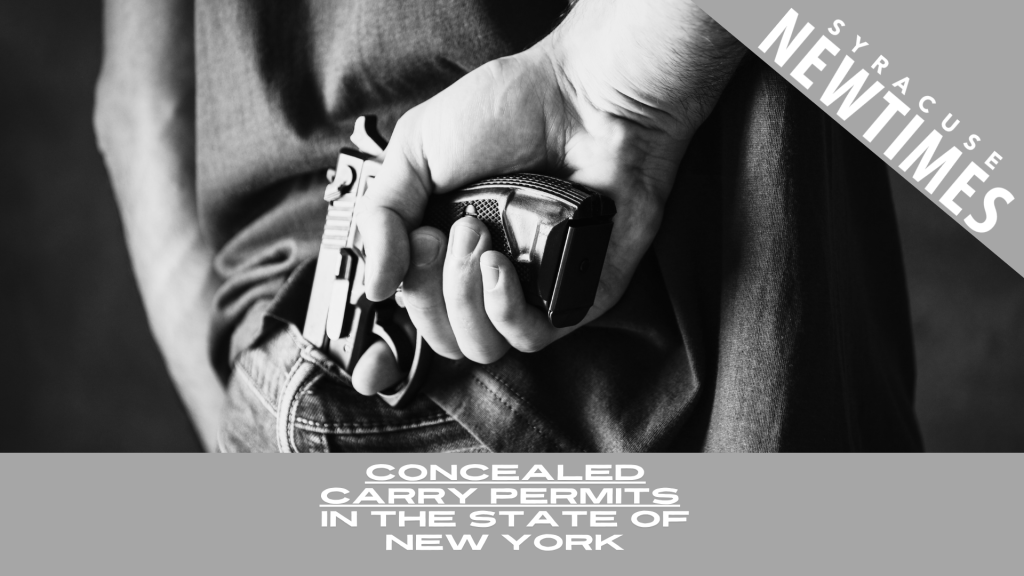In today’s crazy world, the popularity behind carrying a concealed firearm has risen drastically over the apst several years, even suprinisgnly so in northeastern states like New York.
Now, carrying a concealed firearm, often referred to as CCW (Concealed Carry Weapon), requires adherence to very specific laws and regulations, particularly in states like New York, which is known for having some of the strictest gun control laws in the U.S.
Whether you are a New Yorker considering applying for a concealed carry permit or a non-resident curious about the rules because you might be moving there, we’ve taken the liberty to provide you with a comprehensive overview of New York’s concealed carry laws.
Overview of Concealed Carry Laws in New York State
First, lets take a 10,000 foot view of CC in New York.
What Exactly is Concealed Carry?
Concealed carry refers to the practice of carrying a firearm in a concealed manner, typically on your person or within easy reach. This method of carrying a weapon is often very popular among those carrying with the sole intent of protecting themselves, while avoiding alarming others.
In the United States, concealed carry has a strong historical and legal foundation, with the Second Amendment playing a pivotal role in defining gun ownership rights. However, the specifics of how concealed carry is regulated can vary widely state by state.
As we mentioned earlier, there has also been a steady increase in concealed carry permit holders across the country. This is a product of exisitng and new demographics of people making the decision to get a concealed carry permit, with concealed carry guns for women and other areas becoming increasingly popular.
Legal Framework for Concealed Carry in New York
New York’s gun laws stand in stark contrast to many other states, particularly those with more lenient regulations and generally further south.
In general, New York adheres to a “may issue” policy, meaning that local authorities have sole discretion in approving or denying permits based on an applicant’s qualifications and perceived necessity for carrying a concealed weapon.
In addition to these state laws, federal regulations such as the Gun Control Act of 1968 also play a role in defining eligibility criteria.
Eligibility Requirements for Concealed Carry in New York State
Now, let get into the meat of the discussion.
Age and Residency Requirements
In New York, applicants for a concealed carry permit must be at least 21 years old. Additionally, they must also be legal residents of the state, though there are specific provisions for non-residents.
For non-residents, the process is much stricter, often requiring clear and valid reasons for carrying a concealed firearm within state lines.
Background Checks and Criminal History
One of the most stringent aspects of the concealed carry application process in New York is the comprehensive background check.
Individuals with felony convictions, certain misdemeanors, or domestic violence charges are almost always disqualified from obtaining a permit. The state also checks for any pending criminal charges that could affect eligibility.
Mental Health and Substance Use Screening
New York also requires that all applicants undergo a mental health evaluation to ensure they are mentally fit to carry a firearm. Those with a history of involuntary psychiatric hospitalization or substance abuse may be disqualified.
An individual’s medical records may also be reviewed during this part of the application process, as a way to ensure the applicant does not pose a danger to themselves or others.
The Application Process for a Concealed Carry Permit in New York
Next, we’ll get into each step of the CC permit application process in the state of New York.
Step-by-Step Application Process
Applying for a concealed carry permit in New York involves a series of important steps.
Applicants must submit a completed application to their local county office, along with documents such as proof of residency, identification, and reasons for needing a concealed carry permit (often referred to as “good cause” in certain counties).
The local licensing authority will then review all submitted documentation.
Fingerprinting and Fees
Once all documentation is submitted, New York requires fingerprinting as part of the application process. These fingerprints are submitted to both state and federal databases to verify an applicant’s background or any prior issues.
Fees for fingerprinting and the application itself vary by county, but can range between $150 and $400.
Interview Process and Investigation
An in-depth interview with law enforcement officials is a common part of the application process in New York. The interview often explores the applicant’s general reasoning behind requesting a concealed carry permit, as well as assess whether they meet the necessary legal criteria.
Additionally, law enforcement agencies can often conduct investigations that may take several months to complete before a decision is rendered.
Training and Education Requirements
Moving down the list, there are a variety of training requirements for a New York CC permit.
Mandatory Firearms Safety Course
As you might have guessed, New York requires all applicants to complete a firearms safety course as part of their concealed carry permit application. These courses cover basic firearm operation, safety protocols, gun storage, and all state-specific gun laws.
Typically, the course lasts between 8 to 16 hours and includes both classroom instruction and practical exercises and practice.
Live-Fire Training Requirement
In addition to the safety course, New York mandates that applicants complete a live-fire training exercise to demonstrate competency in handling and firing a firearm. Certified instructors oversee these exercises, which must take place at an approved facility.
Restrictions and Prohibited Areas for Concealed Carry in New York
Even with a permit, concealed carry is not allowed everywehere.
Gun-Free Zones
New York law outlines numerous places where carrying a concealed firearm is strictly prohibited.
These areas include schools, government buildings, public transportation, and private establishments that have posted signs banning firearms. Violation of these restrictions can result in severe penalties and sometime loss of your license.
Concealed Carry in New York City
When it comes to New York City, they enforce even stricter rules regarding concealed carry.
While concealed carry permits issued in New York State are not necessarily valid within the city, individuals wishing to carry a concealed weapon in New York City must apply for a separate permit through the NYPD, which has its own set of criteria and restrictions.
Traveling with a Concealed Weapon in New York
Transporting a concealed firearm across county lines or out of state presents another set of challenges.
While concealed carry permits issued by New York State are recognized statewide, they are not valid in other states, unless those states have a reciprocity agreement with New York. Travelers should be and must make themselves familiar with the laws of other states to avoid potential legal issues.
Penalties for Violating Concealed Carry Laws in New York
Sometime understanding the penalties as well as the laws can help CC permit holders avoid unwanted issues
Criminal Charges and Fines
Violating concealed carry laws in New York can result in criminal charges, hefty fines, and even imprisonment in some cases.
Carrying a concealed firearm in a prohibited area or without a valid permit is considered a serious offense. Penalties can range from misdemeanors to felonies, depending on the nature and location of the violation.
Revocation of Concealed Carry Permits
A concealed carry permit can be revoked for several reasons, including violations of gun laws or criminal activity. Those who have had their permit revoked may appeal the decision, but the process is often complex and requires legal representation.
Changes and Updates to New York Concealed Carry Laws
Even if you have passed all required tests and have your CC permit, it is extremely important to keep up to date with any and all changes to the law.
Recent Legislative Changes
In recent years, New York’s gun laws have undergone several different changes, particularly in response to court rulings and legislative efforts aimed at curbing gun violence.
These changes include stricter eligibility requirements and enhanced background checks.
Legal Challenges and Court Rulings
Ongoing legal battles, such as challenges to the state’s “may issue” policy, could potentially alter the concealed carry landscape in New York in years to come.
Court rulings on these issues may also influence future legislation and permit processes, so keep your eyes open for any new changes.
How to Stay Compliant with New York Concealed Carry Laws
Lastly, you want to make sure you taking the right steps and doing the right things to stay compliant with the rules and regulations that come along with owning a New York concealed carry permit.
Keeping Your Permit Valid
To have and maintain a valid concealed carry permit in New York, permit holders must renew their permit at regular intervals, usually every five years. Renewal typically requires a fresh background check and sometimes even additional training.
Resources for Gun Owners
As we have mentioned over and over again, staying up to date with New York’s evolving gun laws is crucial for all concealed carry permit holders.
Resources such as legal advice, gun owner organizations, and state websites provide valuable information for maintaining compliance. There are also clubs you can join that send monthly updates and provide access to an attorney 24/7 in case you need to use your concealed firearm.
Understanding and complying with New York’s concealed carry laws is a complex, but navigatable process for responsible gun owners. Just make sure you’re following the appropriate procedures and staying informed about any legislative changes can help ensure that you remain within the bounds of the law.



